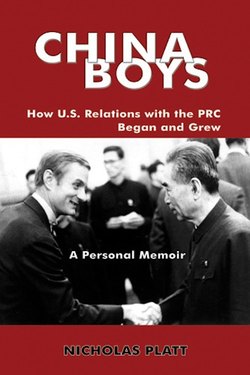Читать книгу CHINA BOYS: How U.S. Relations With the PRC Began and Grew. A Personal Memoir - Nicholas MD Platt - Страница 25
На сайте Литреса книга снята с продажи.
A Collegial Rumor Mill
ОглавлениеChina Watching was intensely and competitively collegial. Visiting diplomats whose governments had embassies in Beijing became treasured sources and friends. Journalists with special knowledge and good contacts as well as scholars with relevant research projects were courted for what they knew. No passing traveler to or from China had to worry about where his next meal was coming from. It did not matter who or what you were, whether government official, newsman, or trader, if you had some knowledge or connection to offer, you were welcome at the table, literally. At regular lunches, organized by my colleagues and me, we chewed over different lines of analysis and traded bits of intelligence.
Members of the group included people who went on to earn big reputations in journalism, government, and academe. The chief of the Mainland Section, FSO John Holdridge, the convener of the club, went on to play a key role in the opening to China as Henry Kissinger ’s aide on the National Security Council Staff and later became U.S. ambassador to Singapore and Indonesia. Other prominent members of the group included Stanley Karnow of the Washington Post; Harvard University’s Ezra Vogel, Richard Solomon, then a professor at Columbia and later a key staff member of the National Security Council; legal scholars like Jerry Cohen from the Harvard Law School and Stanley Lubman from Berkeley; and Michigan professor Michel Oksenberg, who later served with me at the National Security Council.
Other China hands from the American Consulate General included William Gleysteen, later ambassador to Korea, and Burton Levin, who became ambassador to Burma and, later, the Asia Society’s man in Hong Kong. Although he kept his distance from government officials, we all revered Father Laszlo LaDany, an indefatigable Hungarian Jesuit with decades of experience, as the high priest of Hong Kong’s China analysts.
Rumor was a staple of the community. China’s public information system was clamped tight, but its word of mouth grapevine was one of the world’s busiest and most efficient. We all listened hard for real news in the buzzing clouds of gossip. To test the speed of the system, I once told a visiting diplomat that the reason the mayor of Shanghai had not been seen for more than a month (true) was due to liver cancer (false). One week later a Norwegian journalist, just in from Beijing, whispered in my ear that the mayor of Shanghai had—guess what?—liver cancer. Beijing residents reported that juicy items would travel from one end of the capital to another within a day.
